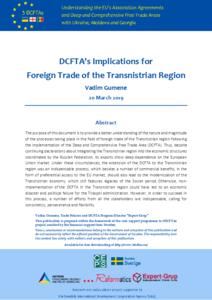
DCFTA’s Implications for Foreign Trade of the Transnistrian Region
The purpose of this document is to provide a better understanding of the nature and magnitude of the processes taking place in the field of foreign trade of the Transnistrian region following the implementation of the Deep and Comprehensive Free Trade Area (DCFTA). Thus, despite continuing declarations about integrating the Transnistrian region into the economic structures coordinated by the Russian Federation, its exports show deep dependence on the European Union market. Under these circumstances, the extension of the DCFTA to the Transnistrian region was an indispensable process, which besides a number of commercial benefits, in the form of preferential access to the EU market, should also lead to the modernization of the Transnistrian economy, which still features legacies of the Soviet period. Otherwise, non-implementation of the DCFTA in the Transnistrian region could have led to an economic disaster and political failure for the Tiraspol administration. However, in order to succeed in this process, a number of efforts from all the stakeholders are indispensable, calling for consistency, perseverance and flexibility.